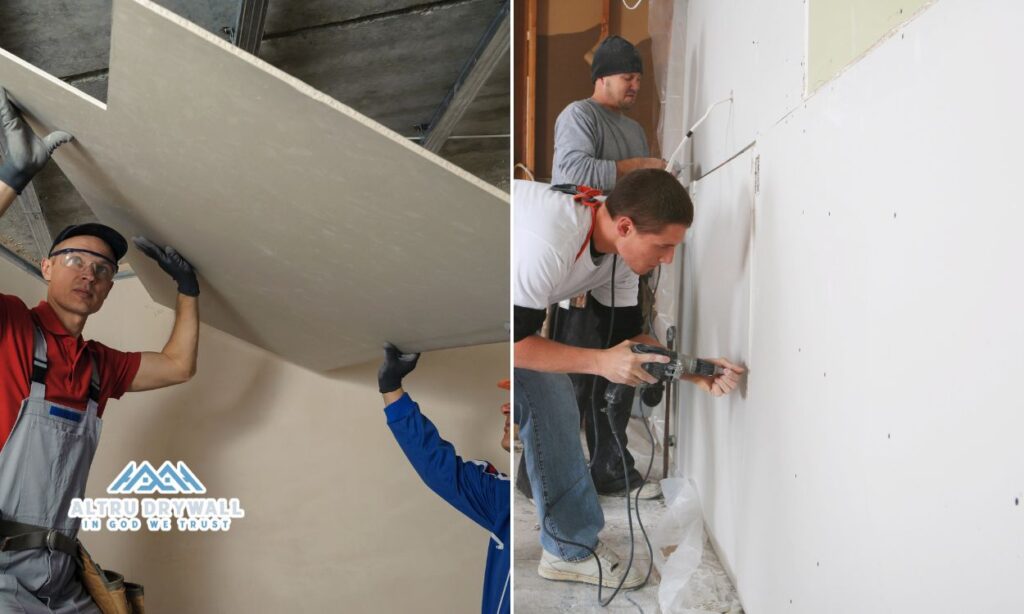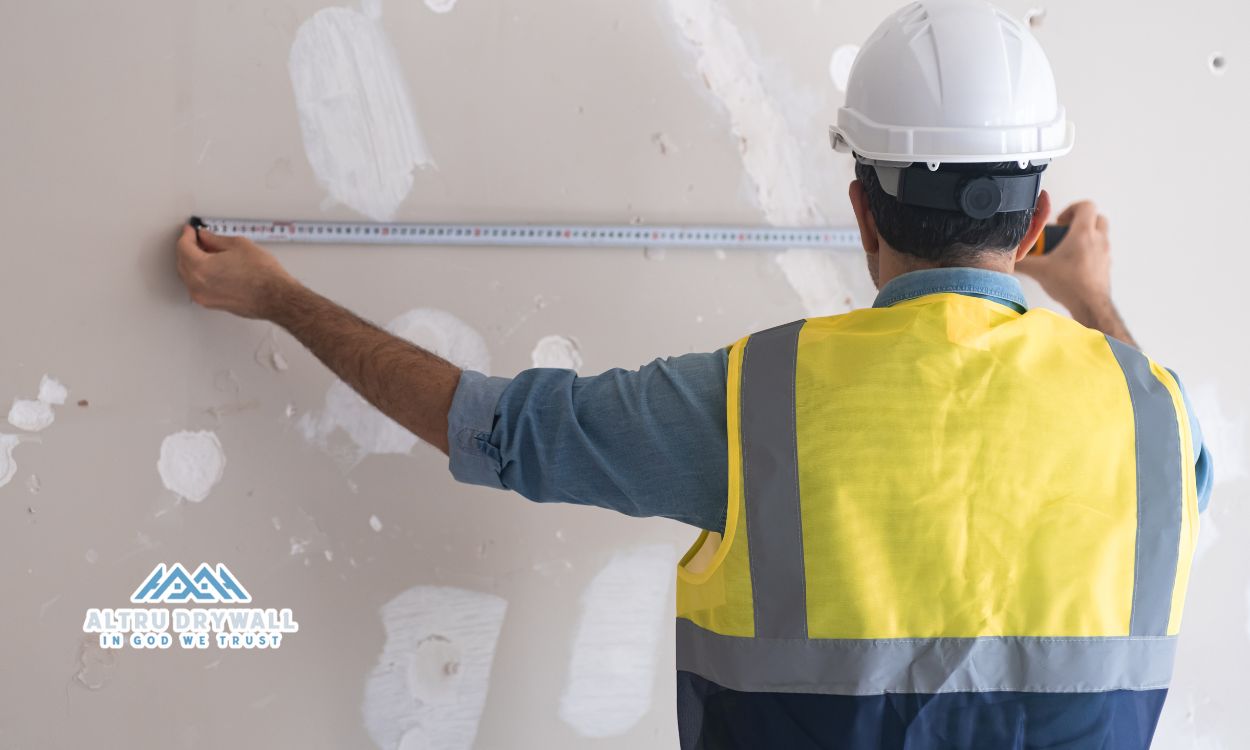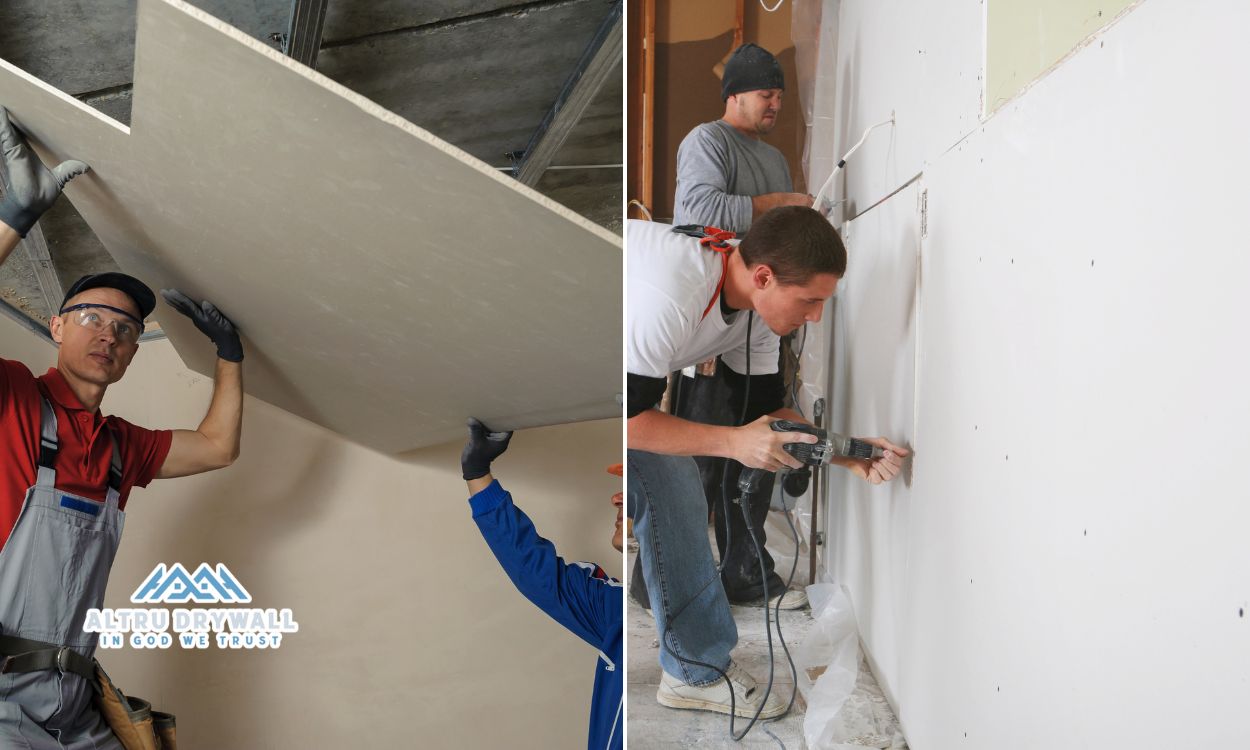When planning a home renovation or construction project, you might come across the terms drywall and Sheetrock. These terms are often used interchangeably because Sheetrock is actually a brand of drywall, much like how Kleenex is a brand of facial tissue. However, while all Sheetrock is drywall, not all drywall is Sheetrock, and there are some key differences to consider. While many people use these terms interchangeably, there are some distinct differences. This article explores the difference between drywall and Sheetrock, their advantages, disadvantages, costs, and how to determine the best choice for your project.
What is Drywall?
Drywall is a building material used to create walls and ceilings. It consists of gypsum plaster pressed between two sheets of thick paper. This construction makes it durable and easy to install, replacing older wall-building methods like lath and plaster.
Types of Drywall
Choosing the right type of drywall is crucial to ensuring durability, functionality, and cost-effectiveness in your construction or renovation project. Different types of drywall are designed to address specific needs, such as moisture resistance, fire protection, and soundproofing. Understanding these options can help you make an informed decision for your home or commercial space. There are different types of drywall depending on the intended use:
- Standard Drywall: The most common type used in residential and commercial applications.
- Moisture-Resistant Drywall: Ideal for bathrooms and kitchens where humidity levels are high.
- Fire-Resistant Drywall: Contains special additives to slow the spread of fire.
- Soundproof Drywall: Designed to minimize noise transmission.
- Mold-Resistant Drywall: Treated to prevent mold and mildew growth.
What is Sheetrock?
Sheetrock is a brand of drywall manufactured by USG (United States Gypsum Corporation). It is essentially the same as drywall but with proprietary additives that improve its quality and durability.
Sheetrock vs. Drywall Comparison
While Sheetrock is a brand name, there are a few key differences:
| Feature | Drywall | Sheetrock |
|---|---|---|
| Composition | Gypsum core with paper backing | Gypsum core with patented additives |
| Brand-Specific Features | Varies by manufacturer | Enhanced durability, mold, and fire-resistant properties |
| Usage | Common for all construction projects | Preferred for high-quality finishes and large-scale projects |
Pros and Cons of Drywall
Pros:
✔ Cost-effective ✔ Easy to install and repair ✔ Available in various types for different applications
Cons:
✘ Can be damaged by moisture ✘ Requires finishing and painting ✘ Not as durable as some other wall materials
Pros and Cons of Sheetrock
Pros:
✔ Higher quality due to manufacturing standards ✔ Better fire resistance (depending on the type) ✔ More durable and mold-resistant than standard drywall
Cons:
✘ More expensive than generic drywall ✘ Slightly heavier, making installation more labor-intensive
Drywall Cost vs. Sheetrock Cost
Pricing varies depending on the type and brand. Generally:
- Standard drywall costs around $12–$20 per panel (4’ x 8’ size).
- Sheetrock costs slightly more, ranging from $15–$30 per panel, depending on the specific type (fire-resistant, mold-resistant, etc.).
In addition to material costs, installation costs should also be considered. Labor expenses for professional installation can range from $1.50–$3.50 per square foot, depending on factors such as project complexity, location, and additional finishing work required. Hiring an expert ensures a seamless installation and prevents costly mistakes. Pricing varies depending on the type and brand. Generally:
- Standard drywall costs around $12–$20 per panel (4’ x 8’ size).
- Sheetrock costs slightly more, ranging from $15–$30 per panel, depending on the specific type (fire-resistant, mold-resistant, etc.).
Drywall Installation vs. Sheetrock Installation
The installation process for both materials is similar and involves:
- Measuring and cutting the panels.
- Securing them to wall studs using drywall screws.
- Applying joint tape and compound to seal seams.
- Sanding the surface smooth before priming and painting.
For expert drywall installation.
For professional Sheetrock installation.
Best Drywall for Home: How to Choose Between Drywall and Sheetrock?
When deciding how to choose between drywall and Sheetrock, consider the following factors:
- Budget: If cost is a primary concern, standard drywall is the more affordable option.
- Quality: If you want the highest quality finish, Sheetrock is a great choice.
- Moisture & Fire Resistance: If your project is in a high-humidity area or requires fire-resistant properties, consider Sheetrock’s enhanced options.
Sheetrock Alternatives
While drywall and Sheetrock are widely used, some homeowners and builders may look for alternatives due to factors such as cost, durability, or aesthetic preferences. Depending on your needs, different materials may offer better moisture resistance, fire protection, or unique design possibilities. If you’re looking for alternatives to drywall or Sheetrock, consider:
- Plaster walls – More durable but require skilled labor.
- Wood paneling – Adds a rustic or modern touch.
- Cement board – Ideal for areas exposed to moisture.
- Plywood – Used for decorative walls and durable surfaces.
Final Thoughts: Drywall vs. Sheetrock – Which One is Right for You?
Choosing between drywall and Sheetrock depends on your project’s needs. If you’re working on a home renovation, standard drywall is a cost-effective and versatile option. For commercial applications or high-end finishes, Sheetrock offers enhanced durability and fire-resistant properties, making it a preferred choice.
If budget is a key concern, drywall is the more affordable option. However, if you want a long-lasting, premium finish, investing in Sheetrock may be the better decision. Consider factors like moisture resistance, fire safety, and soundproofing when making your choice.
For professional drywall and Sheetrock services, contact Altru Drywall today.
Request a free estimate now! Choosing between drywall and Sheetrock depends on your project’s needs. If you’re looking for an affordable and widely available option, standard drywall is a great choice. If you want higher durability and added benefits, Sheetrock is worth the investment.
For professional drywall and Sheetrock services, contact Altru Drywall today.






